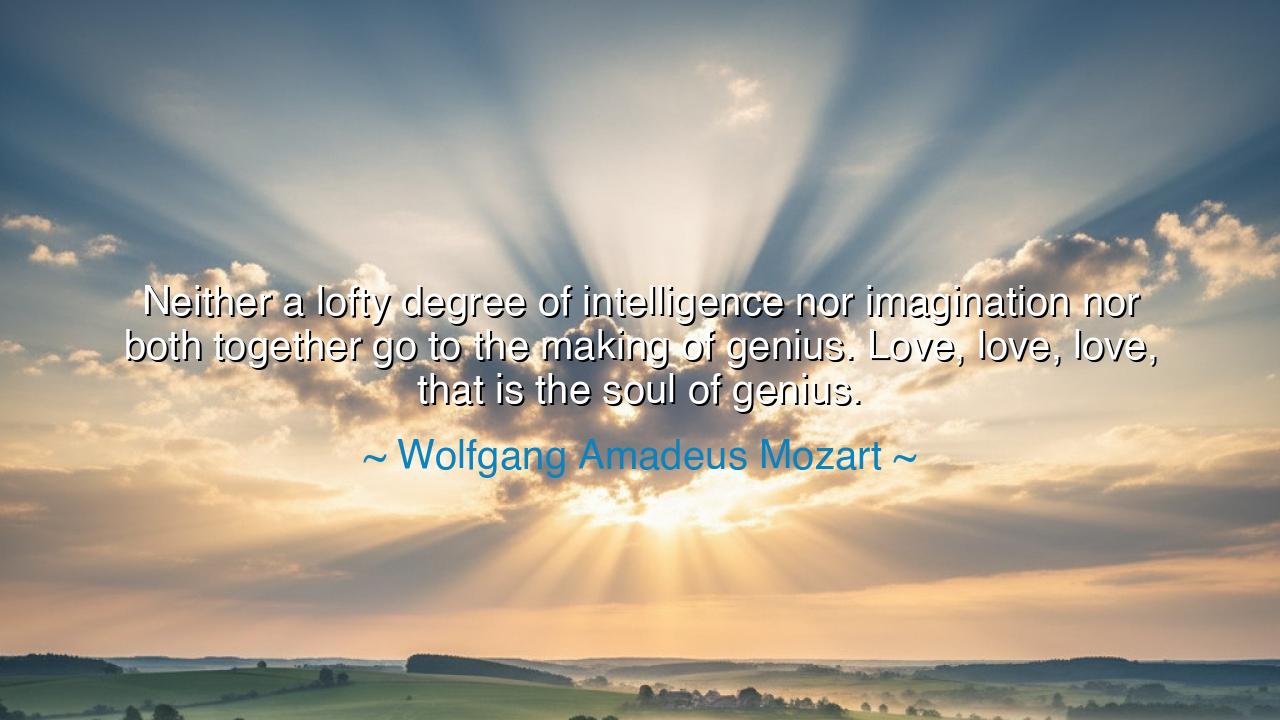
Neither a lofty degree of intelligence nor imagination nor both
Neither a lofty degree of intelligence nor imagination nor both together go to the making of genius. Love, love, love, that is the soul of genius.






“Neither a lofty degree of intelligence nor imagination nor both together go to the making of genius. Love, love, love, that is the soul of genius.” Thus spoke Wolfgang Amadeus Mozart, the divine child of music, whose melodies flowed like sunlight through the soul of humankind. In these words, Mozart revealed the secret that even the learned and the gifted often forget—that genius is not born of intellect alone, nor of imagination unbound, but of love—a love so pure and consuming that it unites heart, mind, and spirit into a single flame. For intelligence can analyze, and imagination can dream, but only love can give those gifts life, meaning, and immortality.
The origin of this quote lies in Mozart’s own life and nature. Though he possessed a mind of remarkable clarity and a gift that defied mortal measure, he did not see himself as a creature of intellect but as a vessel of passion. From childhood, he was surrounded by music as by air; he did not study it as a craft but embraced it as a language of the soul. He worked tirelessly—not from duty, but from devotion. His letters reveal not the cold reasoning of a scholar, but the tender warmth of one who loved every note, every harmony, every human emotion expressed through sound. In his music, joy laughs, sorrow weeps, divinity breathes. To him, love was not merely sentiment—it was the animating power of creation itself.
Mozart understood what many thinkers of his age could not: that genius is not a calculation of the mind but a burning of the heart. The philosopher may dissect the workings of the intellect, the artist may praise imagination as divine, yet without love, both remain barren. Love is the force that transforms knowledge into beauty, thought into vision, and craft into creation. It is the current that runs through all true art, science, and faith. Without it, even the grandest achievements ring hollow, for they lack the pulse of humanity. As fire needs oxygen to burn, so does genius need love—for love alone gives warmth to brilliance and grace to power.
History is filled with souls who proved this truth. Consider Leonardo da Vinci, whose boundless curiosity sprang not from ambition but from love—love of nature, of the human form, of the mysteries that bind heaven and earth. He painted not to impress, but to understand, to connect. Or think of Beethoven, who followed in Mozart’s shadow, deaf and defiant, yet poured into his symphonies all the love that he could no longer speak aloud. These were men who loved their craft, their world, their fellow beings—and through that love, they reached eternity. Intelligence guided their hands, imagination colored their dreams, but it was love that set their souls ablaze and carried them beyond the limits of reason.
Mozart’s words remind us, too, that love is not gentle alone—it is a force of courage and endurance. To love one’s calling is to bear its weight with joy, to suffer for it without bitterness, to lose oneself and yet be found again within it. When Mozart wrote his final masterpiece, the Requiem, his body was failing, his strength fading—but his love for music endured. He poured into that work the essence of his being: grief, faith, tenderness, awe. Though death claimed his flesh, his love gave him immortality. The world still hears it—the sound of a man who, in his last hours, proved that genius is not the triumph of intellect over mortality, but the triumph of love through it.
O seeker of truth, learn from this: the mind is a fine servant, but the heart is the master of creation. You may cultivate knowledge, sharpen wit, and nurture imagination, but if you do not love—if you do not feel that divine pull toward what you create—your work will remain lifeless. Let love be the motive of all your labor, for only love endures beyond time. It is the one power that connects the human to the eternal, the finite to the infinite.
Therefore, let this be your lesson: whatever your gift, whatever your craft, feed it not with pride but with love. Love the process, the struggle, the imperfection that refines you. Love the world enough to add beauty to it. Love the truth enough to serve it. For in that love lies the secret of all genius. And when your work, your art, your life becomes an act of love, then—like Mozart—you will have touched the divine chord that vibrates through all creation, and your song will never cease to echo.






AAdministratorAdministrator
Welcome, honored guests. Please leave a comment, we will respond soon